Synology DS920+ 4-Bay 1GbE NAS Testing
We have a fairly good comparison set picked out for the DS920+ testing:
Intel NAS Performance Toolkit
The Intel NAS Performance Toolkit (Intel NASPT) is a file system exerciser and analysis tool designed to enable performance comparisons between network-attached storage (NAS) devices.
RAID 5 Performance Tests
We ran our tests with a RAID 5 configuration, and most users would use this with a 4x HDD configuration. The NVMe SSD cache was also used with 2x 1TB NVMe SSDs. Smaller capacity NVMe SSD would also work as well; we simply had 1TB drives and used those. We would not expect there to be a great deal of difference with our tests using smaller capacity SSDs here.
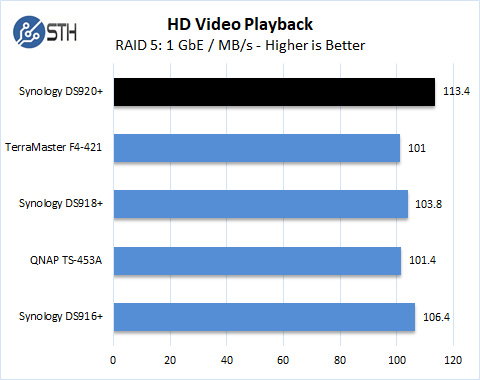
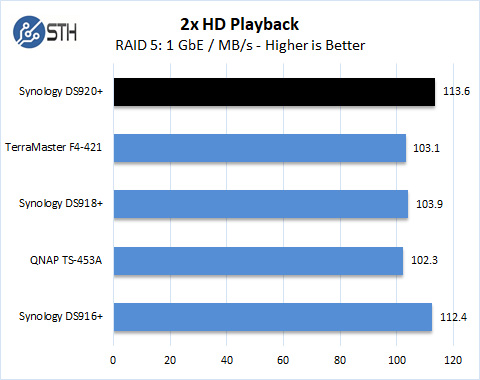
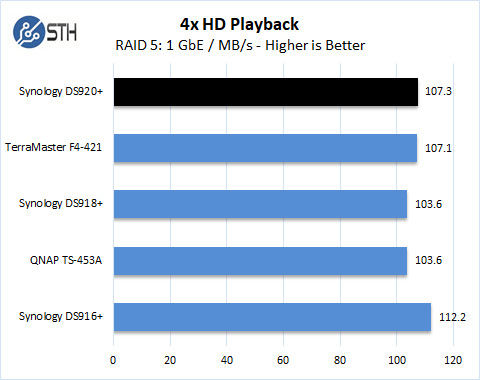
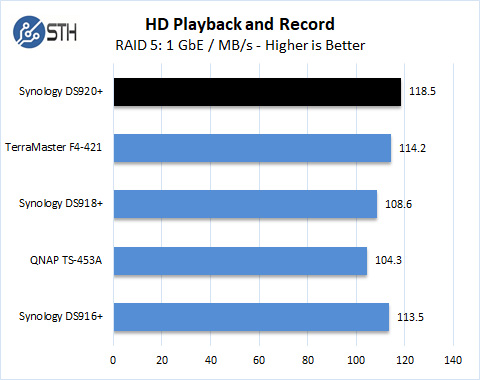
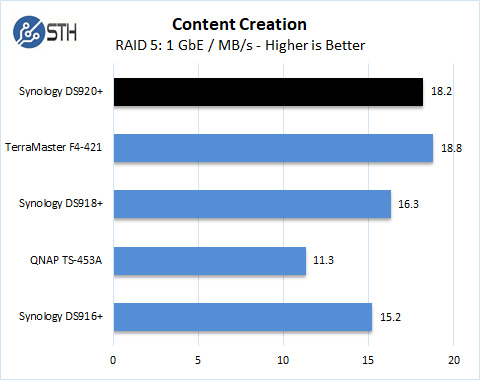
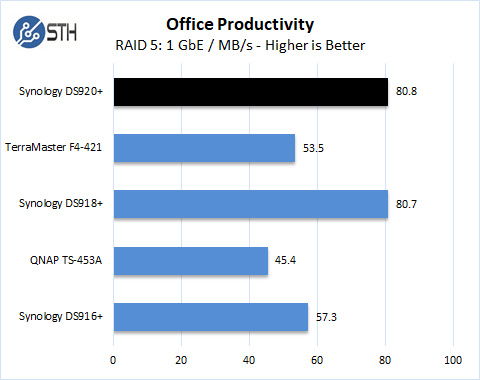
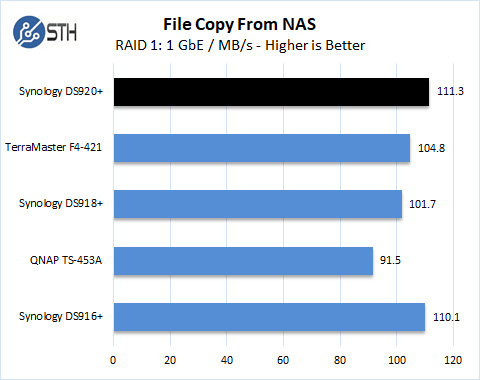
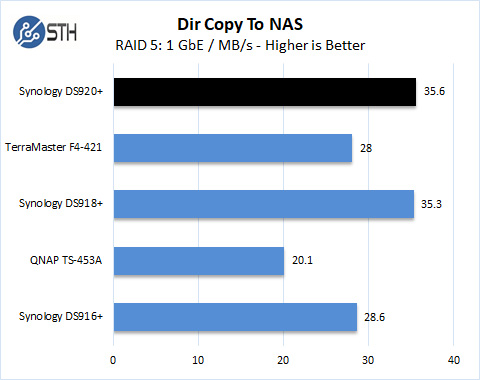

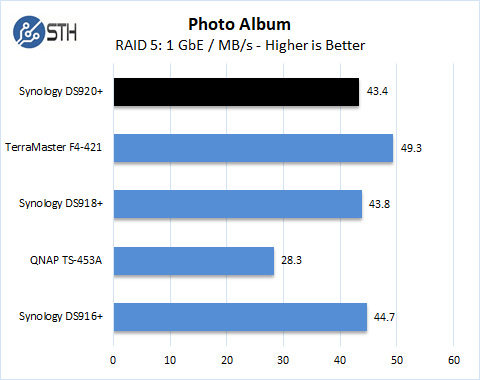
In these tests, we see the Synology DS920+ 4-Bay 1GbE NAS compared to the array of 4-bay NAS’s. What we note is the DS920+ is consistent in performance, generally hitting the top-performing 4-bay NAS with few exceptions. With 1GbE networks, the DS920+ easily saturates the network connecting with or without cache SSDs. Also, to note, our NAS selection spans many years of reviews, there is a wide range of different configurations, including CPUs and RAM load-outs.
One can also make the argument that even older 4-Bay NAS’s perform at acceptable levels when compared to new modern units. In the case of the DS920+ upgrading from an older 4-Bay NAS does not get you much in terms of performance. If these older 4-bay units have been in service for many years, it may be worthwhile to upgrade just to be on newer hardware as electronics degrade over time.
What is likely is that if the DS920+ had a 2.5GbE port it would have been significantly faster than its competition on several of these results.
Let us move on to our RAID 5 Encrypted Performance Tests and finish with our final thoughts.

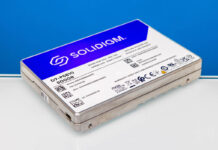
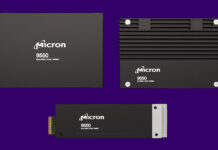
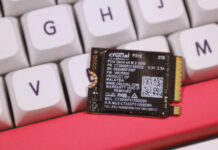
Given the lack of 2.5 GbE I cannot see how you can give such high score. It is nice to have upgradable RAM and NVMe slots, but this NAS is definitely limited by 1 GbE only.
Seeing that this year’s motherboards (both AMD B550 and Intel Z490) are moving to 2.5 GbE more or less as standard it is a shame to not include it in a medium-range 2020 NAS.
Disclaimer: I have owned two Synology NASes over the years. Currently I am running a FreeNAS machine. I really like Synology for their ease of use, but the prices are high for the hardware you get.
Same for me. I was looking into replacing my DS214PLAY. Yes this will be much faster, but not multi-year future proof.
I’ll wait untill QNAP releases its hero OS and look for a 4disk+2,5GBE prosumer nas there.
If you’re happy to give up the USB 3 port, you can install custom drivers and use a 2.5GBE or 5GBE Ethernet to USB adapter.
@Ned Yes that is certainly an option, but it’s annoying that Synology didn’t pay the $2 to $5 cost to have it integrated.
Unfortunately I have to agree with the previous comments : I like the Software but I don’t understand, why the HW is that limited. The price can’t be the reason. In case of the 220+ the memory upgrade options are worse than with the 218+ due to the soldered memory. The processor power is useful for virtual machines but with that little memory? I will stay with my 218+ /16gb machine
Comparing this to the new QNAP TS-431X3 and QNAP TS-431KX it’s obvious that Synology is nickel-and-diming their NAS lineup to prevent the cheaper options to cannibalize the more expensive SMB lineup in an artificial manner. With current HDD capacities not being meaningfully different for most purposes it’s sad to see that Synology is artificially segmenting their lineup to protect the likes of DS1618+ or DS1817.
in all the STH performance tests it’s obvious that the bottleneck is 1GbE.
@Wannes take a look at the above mentioned QNAP models, I’m getting either of those optiosn as soon as they’re in stock locally to me to replace a DS213
The SoC upgrade seems pointless when limited by 1gb networking. Even the lowest targeting market (home users wanting their first NAS) are starting to upgrade to 2.5 and beyond.
To jump on the bandwagon of 1GbE; having never owned a Synology but looking to buy a system, can the two interfaces be aggregated? If I have a managed switch supporting LACP, can I at least get 2Gb throughput (understanding the limitations of TCP sessions)?
@Hans Schober: Yes, you can aggregate the two 1GbE interfaces into a single LACP channel (bond).
@Hans Yes, but if you aggregate the two 2,5 links on a QNAP or asustor you’ll get 5gbps :)
In the hopes that someone from Synology will eventually see these comments and see how incredibly painful this whole 1GbE issue is, I’m going to jump on the bandwagon. I also switched over to FreeNAS, but desperately want to switch back for lower power consumption and ease of use. They know their OS is great, but hey, if QNAP ever comes out with something better (I see someone mentioned hero OS, will have to look into that), Synology will be a thing of the past. This nickel and dime mentality they can’t seem to get over is the reason I will always put my $1k else where. Sorry Synology, get your head right.
I agree with you guys. I hope Synology reads the review and comments.
You can LACP two ports, but this is a low-end NAS meant for SMB. 2.5g is incredibly more useful than 2 1g ports.
I get why it only has 1Gbe in that ifs an inexpensive solution to NAS often installed on 1Gbe networks. My issue with Synology is the cheap software. People rave about it but in the end they cut so many corners and their solution often feel half baked. DSM 7 may fix this but its been delayed for more than a year. Their warranty is painful at best and their prices are high for the name. Overall I’m surprised this scored more than a 6.0.
It seems a little unfair to compare the Synology DS920+ against the aging Qnap TS453A when the 2020 TS453D has been released.
Bother units use the same processor and the 453D adds 2.5Gbe connectivity.
Might be worth updating the charts to compare these to see how they stack up.
Why would a home user need a 2.5Gbe connection? Almost all devices will be 1Gb or lower connections. I don’t consider this a high end NAS, it’s more for streaming media/backup in your home. I don’t own anything that could take advantage of a 2.5Gbe connection. I get that some people have some equipment that could use it, but I think it will be years, until it’s common. The TVs out now in 2020, still have 100Mb connections!!
This review is very useful and share insight. Specially features are explained in details.
“Why would a home user need a 2.5Gbe connection [if] Almost all devices wil lbe 1GB or lower [?]”
A NAS is likely to be simultaneously accessed by multiple devices. If one TV, two PCs, and several torrents are all trying to use the same 1Gbe connection (from a 4 HDD array) then the network connection becomes a bottleneck preventing at least one of those clients from achieving maximum potential throughput.
Future-proofing is a significant concern now (versus 5 years ago). I’ve run Cat6a in my house. If I’m spending $500+ CAD on a NAS, limiting myself to a pair of 1Gbe connections is a real no-go.
This assumes there’s an affordable 10Ge switch for the home user and we’re not there yet. Yes, there are 10GE switches available but most home setups today are on 1Ge networks.